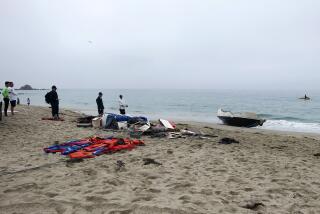Ships With Hidden Spaces Smuggle Haitians Into U.S. : Refugees: The new tactic and a surge in illegal immigration may be linked to the upcoming Clinton inauguration.
- Share via
MIAMI — In what U.S. officials say may be a new tactic in a years-old wave of illegal immigration into southern Florida, more than 200 refugees from Haiti have been smuggled into the country in recent weeks, packed into secret compartments below decks of small wooden freighters that routinely sail right into downtown on the Miami River.
Two such freighters were discovered in local waters last month, and 133 Haitians were taken into custody. A third vessel was intercepted Tuesday 25 miles east of Ft. Lauderdale. The Coast Guard found 206 people on board and took them back to Haiti.
But some make it. A small ship carrying about 70 people pulled up to the dock of a luxury hotel in downtown Miami early Thanksgiving Day. The refugees scampered ashore and hopped into two waiting vans, witnesses told authorities. They have not been seen since.
“There seems to be a trend here, and we’re trying to gather some intelligence to find out how big it is,” said Mike Sheehy, assistant chief of the U.S. Border Patrol in Miami. “These appear to be wholesale smuggling operations, and we think they will continue to increase.”
The rise in the smuggling of illegal immigrants, along with a surge in attempts to sail to Florida, may signal an end to the lull in refugee traffic that has followed the election of Bill Clinton, who has promised to rescind the Bush Administration’s policy of repatriation. Some Haitian activists here speculate that many potential refugees who had been waiting for Clinton’s inauguration are prepared to wait no longer.
“Repression in Haiti is getting worse,” said Rolande Dorancy, director of Miami’s Haitian Refugee Center.
In addition to the 206 people taken off the freighter intercepted Tuesday, the Coast Guard this week repatriated 442 Haitians plucked from two overcrowded sailboats halted in international waters. Aboard one, a 50-foot vessel found Tuesday off the north coast of Cuba, were 283 people, including four infants.
In recent years, many illegal immigrants, traveling in groups of three to 10, have slipped into Miami’s large Haitian community after entering the United States by posing as crew members on freighters. But the size and sophistication of recent smuggling operations have some U.S. officials worried.
“We’re trying to do everything we can to keep this smuggling from increasing,” Sheehy said. “Unfortunately, it’s a big ocean out there, and there are other places to come in besides the Miami River.”
What continues as the United States’ most pressing immigration problem began in the wake of the September, 1991, military coup that sent President Jean-Bertrand Aristide into exile. Since then about 40,000 Haitians fleeing the island country by boat have been picked up by the Coast Guard. Most have been returned.
The first sign of a new tactic in illegal immigration came Nov. 10 when the Coast Guard halted a suspicious-looking freighter in Miami’s Biscayne Bay. Because of a lack of detention space, all 71 people aboard were paroled into the community pending exclusion hearings.
Two weeks later, customs agents looking for drugs stopped another freighter in the Miami River behind the Hyatt Regency Hotel and found 44 men and 18 women packed into separate hidden crawl spaces. Agents said the women were crammed into an area 13 feet long by 3 feet high. Some were naked, some half-dressed, and all were frightened. They told agents that they each paid about $500 for the trip from Haiti.
The third vessel, the 60-foot, wooden-hull Sainte Marie, arrived in early morning darkness on Thanksgiving Day.
Others make it onto American soil in other ways--aboard private vessels, on undetected sailboats or on regularly-scheduled flights into Miami and New York. “It’s a daily occurrence,” said Wayne Joy, acting deputy director of the federal Immigration Naturalization Service in Miami. “Even the smuggling aboard freighters is not new. It’s just the numbers that are.”
Commented Chief Dick Wehn, Coast Guard public affairs officer: “There’s no denying that the number coming in has increased in the last few days. When you start packing in an excess of 200 people on a 50-foot boat, that’s pretty dangerous. People are willing to go through a lot to get here.”
More to Read
Sign up for Essential California
The most important California stories and recommendations in your inbox every morning.
You may occasionally receive promotional content from the Los Angeles Times.













